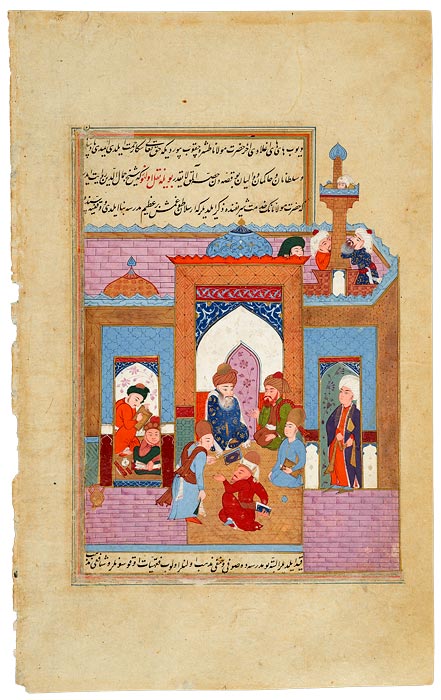
Rūmī, wearing the tall felt hat of his order, and a red bearded man are seated in the schoolroom of a madrasa (school). Behind them is a mihrab niche, found in the wall of mosques, which indicates the direction of prayer. In front of them, and in a smaller room on the left, students converse and study. On the minaret two men, their hands to their ears, give the call to prayer. The richly clad youth in the doorway may be the patron of the building, possibly the young Ḥasan Pasha, son of the Grand Vizier Soqollu Muḥammad Pasha and governor of Baghdad (r. 1598–1602), the patron of several Baghdad school manuscripts.
This miniature is part of a sixteenth-century manuscript account of the life and miracles of the Persian poet and mystic known as Rūmī. It is a Turkish translation of an abridged version of the original fourteenth-century Persian account by the dervish known as Aflākī.
Rūmī, Persian Mystic And Poet
The sixteenth-century miniatures presented here concern the life and miracles of Jalāl al-Dīn Rūmī, called Mē vlāna (Our Master), the most famous member of the Mevlevī order and Persia's greatest Sufi mystic and poet. He was born in Balkh in 1207, but his family emigrated after his father foresaw the Mongol conquest. They eventually resettled in Konya, Turkey, then the capital of Anatolian Rūm (thus Rūmī), where the poet died on 17 December 1273.
Several Persian accounts of Rūmī's life have been written, the first by his son, Sultan Walad. The third, laden with moralizing miracle stories, was ordered by Rūmī's grandson Ulu ˓Ārif Chelebi. It was written by the dervish Shams al-Dīn Aḥmad, called Aflākī (d. 1360). Aflākī also incorporated verses from Rūmī's works, notably his six-volume Masnavī (a poetical form of rhyming couplets) and the Dīvān-i-Shams al-Dīn Tabrīzī, named after Shams of Tabriz, the mystic who changed Rūmī's life and transformed him into a poet when they met in 1244.
In 1590—three and a half centuries after Aflākī wrote his life of Rūmī—the Ottoman sultan Mūrad III ordered a Turkish translation of a 1540 abridged version of Aflākī's text entitled Tarjuma-i Thawāqib-i manāqib (Stars of the Legend). The translator was Darvīsh Mahmud Mesnevī Khān of Konya. Two illustrated copies of the Murād translation, both made in Baghdad, survive. One, dated 1599, is held by Topkapi Palace, Istanbul, and has twenty-two miniatures. The other, richer manuscript is held by the Morgan. It dates to the 1590s and includes twenty-nine miniatures. They are all featured here, along with two folios from other collections that are believed to have once been part of the Morgan manuscript.
